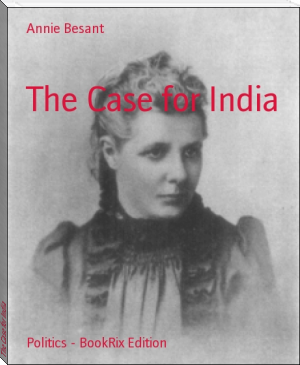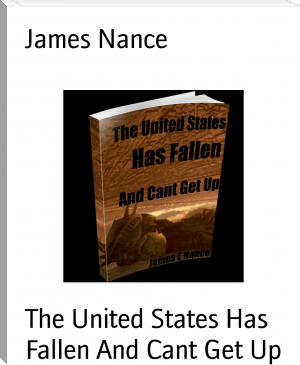The Case for India by Annie Besant (100 best novels of all time TXT) 📕

Read free book «The Case for India by Annie Besant (100 best novels of all time TXT) 📕» - read online or download for free at americanlibrarybooks.com
- Author: Annie Besant
Read book online «The Case for India by Annie Besant (100 best novels of all time TXT) 📕». Author - Annie Besant
The recognition of the right of the Indian Government to make its voice heard in Imperial matters, when they were under discussion in an Imperial Conference, was a step in the right direction. But disappointment was felt that while other countries were represented by responsible Ministers, the representation in India's case was of the Government, of a Government irresponsible to her, and not the representative of herself. No fault was found with the choice itself, but only with the non-representative character of the chosen, for they were selected by the Government, and not by the elected members of the Supreme Council. This defect in the resolution moved by the Hon. Khan Bahadur M.M. Shafi on October 2, 1915, was pointed out by the Hon. Mr. Surendranath Bannerji. He said:
My Lord, in view of a situation so full of hope and promise, it
seems to me that my friend's Resolution does not go far enough.
He pleads for _official_ representation at the Imperial
Conference: he does not plead for _popular_ representation. He
urges that an address be presented to His Majesty's Government,
through the Secretary of State for India, for official
representation at the Imperial Council. My Lord, official
representation may mean little or nothing. It may indeed be
attended with some risk; for I am sorry to have to say--but say
it I must--that our officials do not always see eye to eye with
us as regards many great public questions which affect this
country; and indeed their views, judged from our standpoint,
may sometimes seem adverse to our interests. At the same time,
my Lord, I recognise the fact that the Imperial Conference is
an assemblage of officials pure and simple, consisting of
Ministers of the United Kingdom and of the self-governing
Colonies. But, my Lord, there is an essential difference
between them and ourselves. In their case, the Ministers are
the elect of the people, their organ and their voice,
answerable to them for their conduct and their proceedings. In
our case, our officials are public servants in name, but in
reality they are the masters of the public. The situation may
improve, and I trust it will, under the liberalising influence
of your Excellency's beneficent administration; but we must
take things as they are, and not indulge in building castles in
the air, which may vanish "like the baseless fabric of a
vision."
It was said to be an epoch-making event that "Indian Representatives" took part in the Conference. Representatives they were, but, as said, of the British Government in India, not of India, whereas their colleagues represented their Nations. They did good work, none the less, for they were able and experienced men, though they failed us in the Imperial Preference Conference and, partially, on the Indentured Labour question. Yet we hope that the presence in the Conference of men of Indian birth may prove to be the proverbial "thin end of the wedge," and may have convinced their colleagues that, while India was still a Dependency, India's sons were fully their equals.
The Report of the Public Services Commission, though now too obviously obsolete to be discussed, caused both disappointment and resentment; for it showed that, in the eyes of the majority of the Commissioners, English domination in Indian administration was to be perpetual, and that thirty years hence she would only hold a pitiful 25 per cent. or the higher appointments in the I.C.S. and the Police. I cannot, however, mention that Commission, even in passing, without voicing India's thanks to the Hon. Mr. Justice Rahim, for his rare courage in writing a solitary Minute of Dissent, in which he totally rejected the Report, and laid down the right principles which should govern recruitment for the Indian Civil Services.
India had but three representatives on the Commission; G.K. Gokhale died ere it made its Report, his end quickened by his sufferings during its work, by the humiliation of the way in which his countrymen were treated. Of Mr. Abdur Rahim I have already spoken. The Hon. Mr. M.B. Chaubal signed the Report, but dissented from some of its most important recommendations. The whole Report was written "before the flood," and it is now merely an antiquarian curiosity.
India, for all these reasons, was forced to see before her a future of perpetual subordination: the Briton rules in Great Britain, the Frenchman in France, the American in America, each Dominion in its own area, but the Indian was to rule nowhere; alone among the peoples of the world, he was not to feel his own country as his own. "Britain for the British" was right and natural; "India for the Indians" was wrong, even seditious. It must be "India for the Empire," or not even for the Empire, but "for the rest of the Empire," careless of herself. "British support for British Trade" was patriotic and proper in Britain. "Swadeshi goods for Indians" showed a petty and anti-Imperial spirit in India. The Indian was to continue to live perpetually, and even thankfully, as Gopal Krishna Gokhale said he lived now, in "an atmosphere of inferiority," and to be proud to be a citizen (without rights) of the Empire, while its other component Nations were to be citizens (with rights) in their own countries first, and citizens of the Empire secondarily. Just as his trust in Great Britain was strained nearly to breaking point came the glad news of Mr. Montagu's appointment as Secretary of State for India, of the Viceroy's invitation to him, and of his coming to hear for himself what India wanted. It was a ray of sunshine breaking through the gloom, confidence in Great Britain revived, and glad preparation was made to welcome the coming of a friend.
The attitude of India has changed to meet the changed attitude of the Governments of India and Great Britain. But let none imagine that that consequential change of attitude connotes any change in her determination to win Home Rule. She is ready to consider terms of peace, but it must be "peace with honour," and honour in this connection means Freedom. If this be not granted, an even more vigorous agitation will begin.
LOSS OF BELIEF IN THE SUPERIORITY OF WHITE RACES
The undermining of this belief dates from the spreading of the Arya Samaj and the Theosophical Society. Both bodies sought to lead the Indian people to a sense of the value of their own civilisation, to pride in their past, creating self-respect in the present, and self-confidence in the future. They destroyed the unhealthy inclination to imitate the West in all things, and taught discrimination, the using only of what was valuable in western thought and culture, instead of a mere slavish copying of everything. Another great force was that of Swami Vivekananda, alike in his passionate love and admiration for India, and his exposure of the evils resulting from Materialism in the West. Take the following:
Children of India, I am here to speak to you to-day about some
practical things, and my object in reminding you about the
glories of the past is simply this. Many times have I been told
that looking into the past only degenerates and leads to
nothing, and that we should look to the future. That is true.
But out of the past is built the future. Look back, therefore,
as far as you can, drink deep of the eternal fountains that are
behind, and after that, look forward, march forward, and make
India brighter, greater, much higher than she ever was. Our
ancestors were great. We must recall that. We must learn the
elements of our being, the blood that courses in our veins; we
must have faith in that blood, and what it did in the past: and
out of that faith, and consciousness of past greatness, we must
build an India yet greater than what she has been.
And again:
I know for certain that millions, I say deliberately, millions,
in every civilised land are waiting for the message that will
save them from the hideous abyss of materialism into which
modern money-worship is driving them headlong, and many of the
leaders of the new Social Movements have already discovered
that Vedanta in its highest form can alone spiritualise their
social aspirations.
The process was continued by the admiration of Sanskrit literature expressed by European scholars and philosophers. But the effect of these was confined to the few and did not reach the many. The first great shock to the belief in white superiority came from the triumph of Japan over Russia, the facing of a huge European Power by a comparatively small Eastern Nation, the exposure of the weakness and rottenness of the Russian leaders, and the contrast with their hardy virile opponents, ready to sacrifice everything for their country.
The second great shock has come from the frank brutality of German theories of the State, and their practical carrying out in the treatment of conquered districts and the laying waste of evacuated areas in retreat. The teachings of Bismarck and their practical application in France, Flanders, Belgium, Poland, and Serbia have destroyed all the glamour of the superiority of Christendom over Asia. Its vaunted civilisation is seen to be but a thin veneer, and its religion a matter of form rather than of life. Gazing from afar at the ghastly heaps of dead and the hosts of the mutilated, at science turned into devilry and ever inventing new tortures for rending and slaying, Asia may be forgiven for thinking that, on the whole, she prefers her own religions and her own civilisations.
But even deeper than the outer tumult of war has pierced the doubt as to the reality of the Ideals of Liberty and Nationality so loudly proclaimed by the foremost western Nations, the doubt of the honesty of their champions. Sir James Meston said truly, a short time ago, that he had never, in his long experience, known Indians in so distrustful and suspicious a mood as that which he met in them to-day. And that is so. For long years Indians have been chafing over the many breaches of promises and pledges to them that remain unredeemed. The maintenance here of a system of political repression, of coercive measures increased in number and more harshly applied since 1905, the carrying of the system to a wider extent since the War for the sanctity of treaties and for the protection of Nationalities has been going on, have deepened the mistrust. A frank and courageous statesmanship applied to the honest carrying out of large reforms too long delayed can alone remove it. The time for political tinkering is past; the time for wise and definite changes is here.
To these deep causes must be added the comparison between the progressive policy of some of the Indian States in matters which most affect the happiness of the people, and the slow advance made under British administration. The Indian notes that this advance is made under the guidance of rulers and ministers of his own race. When he sees that the suggestions made in the People's Assembly in Mysore are fully considered and, when possible, given





Comments (0)